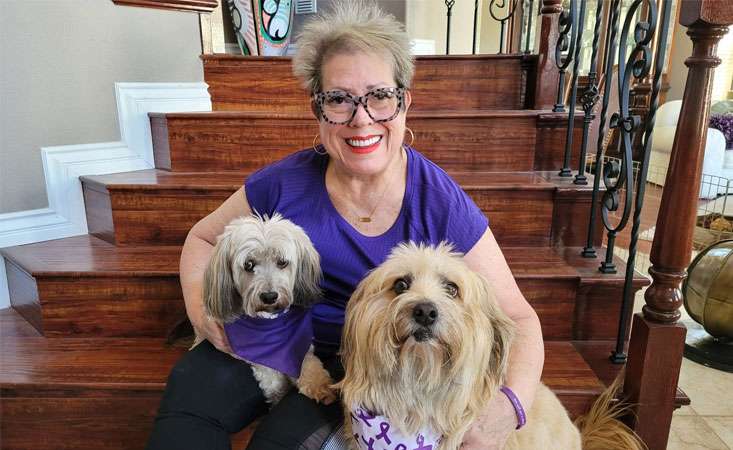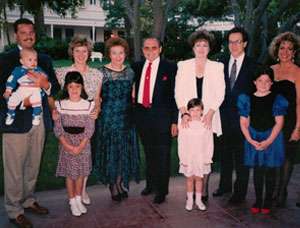
Pamela Acosta Marquardt, PanCAN’s founder, shares why genetic testing was important for her.
My test results came back a few months ago.
Negative.
No inherited genetic mutations that would indicate I have a higher likelihood of developing pancreatic cancer.
The results of my genetic testing gave me peace of mind. And with this knowledge I felt empowered. Powerful. More in control.

Pam, far right, with family and her mother Rose, center left, who died of pancreatic cancer in 1996.
Because pancreatic cancer, as you likely know, is a scary disease. I know this not only because of the work that I do every day, but from first-hand experience. Pancreatic cancer took my mother’s life in 1996.
I had a scare of my own three years ago when – by complete accident – doctors discovered cysts on my pancreas…
I want to be one of the millions of people who have cysts on their pancreas and nothing more serious (like pancreatic cancer) ever comes of it.
So, my wonderful healthcare team keeps a close eye on me and monitors the cysts regularly. But still, for me it was very important to go a step further and be as proactive as possible about my health – and that included finding out if I might have inherited a predisposition to pancreatic cancer from my mother.
Having genetic testing done meant that I could be proactive, not reactive. I sit firmly in the “knowledge is power” camp, and genetic testing reinforced my inclination to learn more.
The latest NCCN guidelines, which recommend who should have genetic testing done, have recently changed and broadened. They state that anyone who has even one first-degree relative (mother, father, sister, brother, child) with pancreatic cancer should have genetic testing.
I remember the day I read PanCAN’s announcement about the new guidelines.
I thought, “Woo-hoo, I can’t wait to go to my doctor with this information!” I sent her a note that day along with the guidelines – having these in hand made my conversation with her go even easier. I simply told her I was requesting a genetic test and she connected me with a genetic counselor right away.
A genetic counselor goes over your genealogy and discusses who in your family has had cancer, what type it was, and more. They lay it all out, like a family tree of cancer. They can also likely petition your insurance company to cover the cost of testing.
For me, the entire process went very smoothly. I had a blood test done, although typically it’s a saliva test (my salivary glands are damaged from radiation treatments years ago for thyroid cancer).
With the saliva test, the kit can come directly to your house within a couple of days. My genetic counselor called with the results within a few weeks.
She said, “Good news, everything came back negative.”
Of course, my negative results don’t mean that I definitely won’t get pancreatic cancer, and I plan to keep having my cysts closely monitored. But knowing I don’t have a mutation brings peace of mind and the ability to be proactive and informed about my own healthcare.
What could be better than that?
I realize that it can be intimidating to have genetic testing done. But I see it as an opportunity, not a threat. Especially since there is no early detection test for pancreatic cancer (although PanCAN is working on progress in early detection research, and we’ve just announced our Early Detection Initiative).
If I had had positive results indicating I did have an inherited genetic mutation, I could have taken steps to be even more proactive…be diligent with ultrasounds and consider pancreatic cancer surveillance programs that people at high-risk can be part of.
The latest NCCN guidelines allow all of us to be more in control. Print them out and take them to your medical team.
Be empowered to educate and share and take action.
It’s a positive thing.
*
Editor’s note: PanCAN also strongly recommends all pancreatic cancer patients get genetic testing for inherited mutations and biomarker testing of their tumor tissue to help determine the best treatment options. Our Patient Services can help you learn more about which tests might be right for you and how to access them. For pancreatic cancer, around 10% of cases are thought to be hereditary, which means a risk for the disease runs in the family.
We extend a special thank you to Pam for sharing her story.
*















